 Petzlover
Petzlover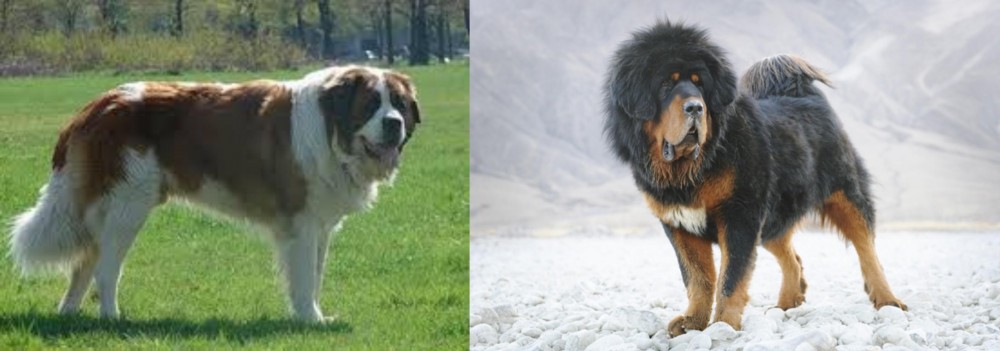 Moscow Watchdog is originated from Russia but Tibetan Mastiff is originated from China. Moscow Watchdog may grow 14 cm / 5 inches shorter than Tibetan Mastiff. Moscow Watchdog may weigh 22 kg / 48 pounds lesser than Tibetan Mastiff. Moscow Watchdog may live 3 years less than Tibetan Mastiff. Moscow Watchdog may have more litter size than Tibetan Mastiff. Both Moscow Watchdog and Tibetan Mastiff requires Moderate Maintenance.
Moscow Watchdog is originated from Russia but Tibetan Mastiff is originated from China. Moscow Watchdog may grow 14 cm / 5 inches shorter than Tibetan Mastiff. Moscow Watchdog may weigh 22 kg / 48 pounds lesser than Tibetan Mastiff. Moscow Watchdog may live 3 years less than Tibetan Mastiff. Moscow Watchdog may have more litter size than Tibetan Mastiff. Both Moscow Watchdog and Tibetan Mastiff requires Moderate Maintenance.
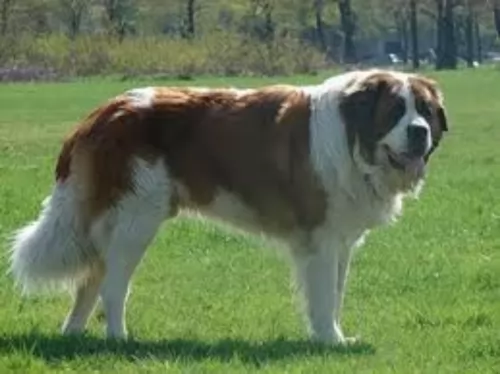 The Moscow Watchdog is a cross between the Caucasian Oytcharka, the St. Bernard and other Russian hound dogs. This large breed dog was developed in the Soviet Union for the purpose of being guard dogs. It had the awareness and assertiveness of the Oytcharka and the size, intelligence and attractiveness of the St. Bernard. The breed is common in Russia today but hardly seen anywhere else even though they were exported to the United States and Europe. The breed had the first U.S. born litter in 2015 and it is not AKC recognized.
The Moscow Watchdog is a cross between the Caucasian Oytcharka, the St. Bernard and other Russian hound dogs. This large breed dog was developed in the Soviet Union for the purpose of being guard dogs. It had the awareness and assertiveness of the Oytcharka and the size, intelligence and attractiveness of the St. Bernard. The breed is common in Russia today but hardly seen anywhere else even though they were exported to the United States and Europe. The breed had the first U.S. born litter in 2015 and it is not AKC recognized.
Following the second world war crime was on the rise in the Soviet Union and a new breed of dog was needed to counter this trend. The dog had to be adaptable to very cold temperatures, snowy weather and have a guard dog personality and ability. The breed was called on to guard such locations as railroads, government offices, warehouses, infrastructure and labor camps.
The project to develop this breed was led by General Medvedev beginning in 1946 at the Central School of Military Kynology – which was a department of the Soviet Ministry of Defense. It took many years to develop the Moscow Watchdog which then became a very successful breed.
It took until 1985 for the breed to be “officially” recognized in the Soviet Union and until 1992 to be recognized by the Federation of Dog Breeders in Russia and until 1997 for the standard to be approved by the Russian Kennel Club. They are still working with the FCI to gain international recognition for the breed. At the moment they are considered a part of the Molosser group and shown in the “Special Show” in Russia.
Committed breeders brought the Moscow Watchdog to Hungary in 1986 in order to make the breed more popular. In addition to this there were many breeders from previous Soviet States that wanted to preserve the breed as well. There were about 500 Moscow Watchdogs in Hungary around then. Currently there are about 27 Moscow Watchdogs in the United States. The breed is known to be a gentle giant and very much a family dog these days.
 The Tibetan Mastiff is still considered to be a primitive breed originating in Tibet centuries ago. The breed was developed to guard property and livestock. They still do this as well as being a much loved family dog and a show dog as well. There is very little history that is documented for the breed prior to the 19th century.
The Tibetan Mastiff is still considered to be a primitive breed originating in Tibet centuries ago. The breed was developed to guard property and livestock. They still do this as well as being a much loved family dog and a show dog as well. There is very little history that is documented for the breed prior to the 19th century.
Believed to be centuries old with ancestors who are mastiff like dogs that developed into two different types of Tibetan Mastiffs. These types are the Tsang-Khyi and the Do-Khyi. The Tsang Khyi were guardians for Tibetan monks, while the Tsang-Khyi guarded flocks for nomadic shepherds and in villages.
The first Tibetan Mastiff was imported in 1847 to England and presented as a gift to Wueen Victoria, from India’s Viceroy. By 1873 there was an English Kennel Club and the breed was labeled a large dog from Tibet and entered into the EKC Stud Book.
The next year the future King Edward VII, brought another two Tibetan Mastiffs to the United Kingdom to show in 1875. The first breed club began in 1931. The world wars interfered and no new dogs were imported to England until 1976. Two dogs were given to the President of the United States in the late 1950’sbut were not bred and it wasn’t until 1970 that any more were imported. The US Tibetan Mastiff Club was not founded until 1974 and they were first entered in a National Specialty show in 1979.
In 2007 the AKC recognized the breed as a working dog since 2007. It’s hard to find a purebred Tibetan Mastiff in Tibet anymore.
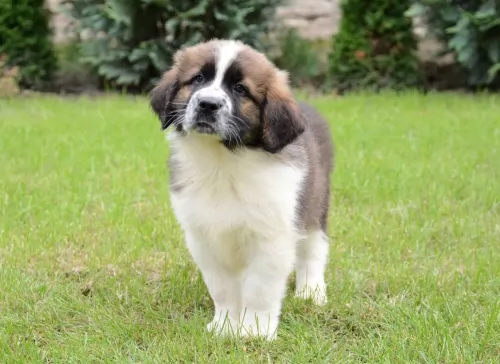 The Moscow Watchdog is related to the mountain dogs and is a very large breed. They are sturdy, muscular and powerful. They have big heads and a thick double coat that sheds profusely four times a year. They have a long tail, an arched chest and an air of confidence.
The Moscow Watchdog is related to the mountain dogs and is a very large breed. They are sturdy, muscular and powerful. They have big heads and a thick double coat that sheds profusely four times a year. They have a long tail, an arched chest and an air of confidence.
He is in the Mastiff family and is smart and trainable. He is not clumsy but has big bones. He is surprisingly agile and active for a dog his size. Unlike the St. Bernard he is not a couch potato. He is also differentiated from the St. Bernard because he does not drool.
These dogs are large but they’ve got a gentle temperament and are good with kids, being playful and energetic with them.
Even though he is a docile dog, you want him trained and socialized, and then he gets along well with other pets too. His sheer size makes it that it is best to supervise him when he’s around small children. He is also a protective dog breed, willing to bond closely to, and protect his human family.
 Both types of Mastiffs can be present in the same litter, so that both larger and smaller pups are present. Both types are well-muscled and structured. Today’s dogs being developed in China and the West are much larger than the previous ones. These dogs would be less useful to the nomads and cost too much to feed. Today’s dog is very large with a large head and a long double coat. This coat can be black, brown, gold, and blue, with or without tan markings. There are now a few white Tibetan Mastiffs being bread.
Both types of Mastiffs can be present in the same litter, so that both larger and smaller pups are present. Both types are well-muscled and structured. Today’s dogs being developed in China and the West are much larger than the previous ones. These dogs would be less useful to the nomads and cost too much to feed. Today’s dog is very large with a large head and a long double coat. This coat can be black, brown, gold, and blue, with or without tan markings. There are now a few white Tibetan Mastiffs being bread.
The breed standard for the Mastiff is different in the West than in the East. In the East the breed is broken into two categories – the Lion Head and the Tiger head.
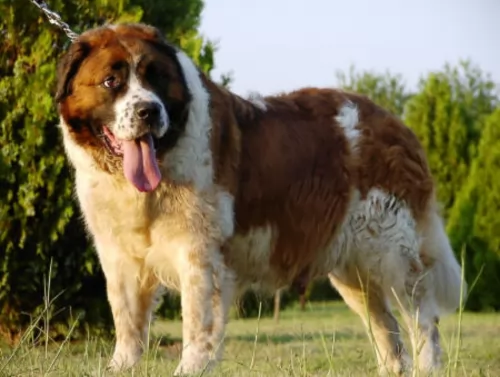 This is a large dog who likes to be involved and busy, even though he is so big. He isn’t suited to city life and being confined to a tiny garden as he needs space.
This is a large dog who likes to be involved and busy, even though he is so big. He isn’t suited to city life and being confined to a tiny garden as he needs space.
They’re independent dogs too and you can leave them alone during the day. He is social, so while you can leave them during the day while you’re at work, he’ll want your attention when you get back. They're such loving, loyal family pets that you owe it to him to make this gentle giant of a dog as happy as can be.
 Moscow Watchdog is looked upon as a fairly healthy dog breed but there are some risks such as hip dysplasia as well as some other large breed problems.
Moscow Watchdog is looked upon as a fairly healthy dog breed but there are some risks such as hip dysplasia as well as some other large breed problems.
With big dogs like this, hip dysplasia is a threat. Its an hereditary condition where the parent dogs pass down the problematic genes. Hip dysplasia results in inflammation and pain for your pet, and where once he loved to play, he is reluctant to and battles to get up after lying down.
 Though considered a primitive dog and isolated for several centuries, so they should not have as many genetic or inherited conditions as other dogs with more cross and in-breeding. These are the potential health issues they might develop:
Though considered a primitive dog and isolated for several centuries, so they should not have as many genetic or inherited conditions as other dogs with more cross and in-breeding. These are the potential health issues they might develop:
Elbow and Hip dysplasia – can lead to lameness and arthritis.
OCD Osteochondrois Dissecans – this is also an orthopedic condition when the soft tissue growth is abnormal in the joints. It is painful and the joint is stiff. Don’t breed a dog that has this condition.
Panosteitis – Canine growing pains. Inflammation of the long bones in large dogs as they grow. They will eventually out grow it. Pain can be managed through medication.
Autoimmune Hypothyroidism – Hormone deficiency leading to flaky skin, weight gain and lack of energy. Can be managed through medication.
Canine Inherited Demyelinative Neuropathy – If your Tibetan Mastiff is going to have this condition, they will have it by six weeks of age. Weakness in the hind legs leading to paralysis.
Bloat – deadly if not treated immediately and related to dietary habits.
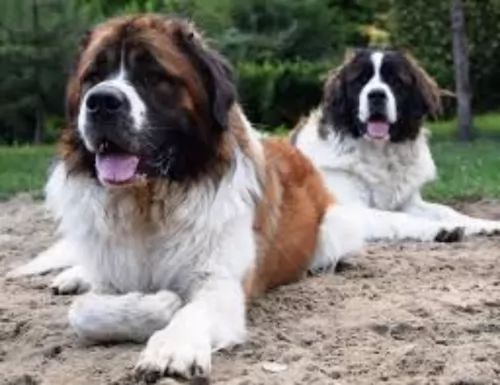 The Moscow Watchdog is a giant sized dog and will require a lot of regular exercise, and apart from a fairly brisk daily walk, will also need games and a run in the park.
The Moscow Watchdog is a giant sized dog and will require a lot of regular exercise, and apart from a fairly brisk daily walk, will also need games and a run in the park.
As a large dog requiring a regular dose of physical exercise as well as mental stimulation, he is better suited to life in the country or at least where there is a large garden.
The Moscow Watchdog has a medium length coat, and as a moderate shedder, you will need to simply brush his coat twice a week to remove loose hair. There is no professional grooming required for these dogs.
Homemade food is always a treat for a dog, but if you’re feeding your Moscow Watchdog commercially manufactured food because of the sheer convenience it provides, make sure the packaging says 'large- or giant dog breed' food. This way you know your pet is getting the right amount of minerals and vitamins for his size.
Always buy the best quality food to avoid giving your pet an overdose of colorants and preservatives. Try and give your pet some home-made food such as boiled chicken, some brown rice or pasta and some cooked vegetables such as sweet potatoes, carrots and spinach. These can be added to his kibble every now and again.
A simple diet like this agrees with your pet and he will be healthy and happy with his lot.
 Don’t feed the puppy too much protein as you want to prevent Panosteitis and growing too quickly. Do not overfeed. Feed 4-5 cups of high quality large breed puppy food in 3-4 meals day.
Don’t feed the puppy too much protein as you want to prevent Panosteitis and growing too quickly. Do not overfeed. Feed 4-5 cups of high quality large breed puppy food in 3-4 meals day.
4 to 6 or more cups of a high-quality dog food daily, divided into two meals. To avoid bloat do not feed before or after vigorous exercise.
Calm and laid back when inside.
They need 20-30 minutes of vigorous exercise and play daily. They prefer to play with other large dogs.